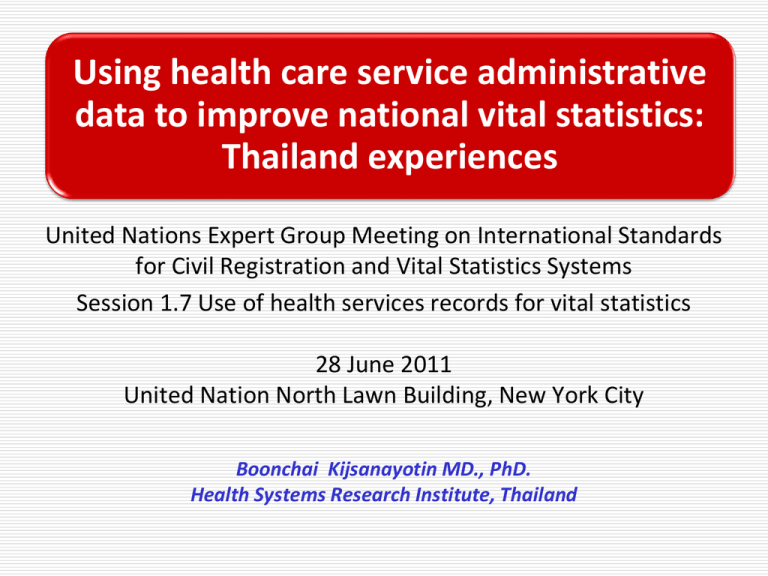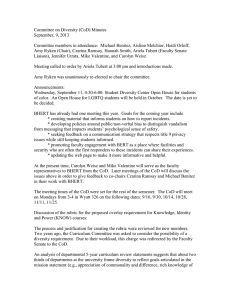Using health care service administrative data to improve national vital statistics:
advertisement

Using health care service administrative data to improve national vital statistics: Thailand experiences United Nations Expert Group Meeting on International Standards for Civil Registration and Vital Statistics Systems Session 1.7 Use of health services records for vital statistics 28 June 2011 United Nation North Lawn Building, New York City Boonchai Kijsanayotin MD., PhD. Health Systems Research Institute, Thailand Outline Thailand Civil Registration System Thailand Vital statistics System Health care service administrative data Using administrative data to improve vital statistics Civil Registration System 1909: Monarchy (King Rama V); Western colonization period the first registration law was enacted specified the preparation and maintenance of population registration and creation of birth and death registration. 1917, enforced births and deaths registration throughout the kingdom. Civil Registration System 1936: The democratic revolution creation of a network of local registry office, acting registrars, laid down clear guidelines for the registration of birth, death, fetal death (for the first time) 1956 Comprehensive civil registration act increased number of registration offices spreading over the entire country Civil Registration System 1972 Revise civil registration act (Military government) appointment hierarchy of registration authorities laid down clear procedures for vital registration specified types of informants place and time for registration, forms, functions, responsibility of registrars, and other requirement for registration. 1982 the Population Identification Number Project. Start of the computerized population database. MOI Central Data Processing <<BACK Civil Registration System National Authority: Bureau of Registration Administration Department of Local Administration, Ministry of Interior Operates and maintains the data base for the entire population of the country, and issues identity cards and household booklets Citizen Identification Number Citizen ID issues at the of birth registration Called 13 Digits number The number is needed when transact with government and many non government agencies: getting free healthcare services enrolling children to free education asking for bank account. Citizen Identification Card 1969-1986 Typing machine 1987 – 1996 Computer ID card Printout ID card Current Smart card type ID card Vital statistics system The compilation of vital statistics was initiated in 1920 Vital Statistics Division was established in MOPH in 1942. 1993 Health Information Center, Bureau of the Health Policy and Strategy, the Office of the Permanent secretary of the MOPH. Vital statistics Before 1996 Ministry of Interior Central Registry Copy birth/death list for validation Compile, code, validate and process statistics Aggregated report by Province MOI Local Register Printed Annual Vital statistics report Ministry of Public Health Copy Birth/ Death list Provincial Health offices Send copy of death certificates Hospitals Weakness of the systems Discrepancy of birth/death counts between report from provincial health offices and MOI central registry Not timely: report lag time 2-3 years Cannot validate cause of death Need a lot of data entry personnel to enter data from hospital’s death certificate Streamline vital event data between MOI & MOPH 1996, The Ministry of Public Health has signed an agreement with the Department of Local Administration, Ministry of Interior, regarding utilization of data in the central registration database of the administration, in order to reduce redundancy of birth, death data. The Department of Local Administration, Ministry of Interior, will send the data relevant to death of all the persons who have been registered birth, dead from the central registration database to the Office of Permanent Secretary of the Ministry of Public Health. After 1996 - Present Ministry of Interior Central Registry Electronic files Compile, code, validate and process statistics Ministry of Public Health Report statistics back to provinces Provincial Health offices Printed/ Web Vital statistics report Web entry death certificates (start 2006) Hospitals Health care service administrative data 2001 implemented Universal care program 3 Major health insurance schemes Civil Servant Medical Benefit Scheme (CSMBS) 5.6 million civil servants and their dependants (9% Pop.) Social Security Scheme (SSS) 8.8 million private employees (14% Pop.) Universal Health-care Coverage Scheme (UCS) 45 millions (77 % of Pop) Casemix Information System Diagnosis Related Groups (DRGs) : acute in-patient financing tool Insurance schemes reimburse hospitals using DRGs 5 millions in-patients (7 millions admission)/year Standard data sets for health insurance Patient demography Citizen ID Diagnosis and Procedure (ICD Coded) Patient discharge status (e.g. recovery, death, transfer etc.) Flow of vital event registration Electronic file transfer monthly Ministry of Interior ICD-10 coding at MoPH (BPS) On-line system Death registration at district office or municipality Medical death certificate form (In-hospital) with COD Death certificate by doctor Death inside hospital Death notification form (Non-hospital) with COD Death notification by village head 40% Death outside hospital 60% Death counts and Cause of Death (COD) Death data processed Total death ~400,000 / year Code cause of death with ICD 10 Compile and Analyzed Annual reports in print and web format Provide provinces population, birth, death information every month Decrease ill defined COD (R0-R99) from 45% to 37% Problems of Causes of death data High % of ill-defined causes of death Non-hospital death (relatives provide general symptoms or senility as the causes of death) In-hospital death (doctors use mode of death instead of the causes) Problems of Causes of death data Misclassification of causes of death In-hospital death (doctors select and write the wrong COD) Non-hospital death (relatives bias the causes of death to avoid stigma such as HIV) Ill-defined causes of death %Ill-defined 100 80 60 40 20 0age0_1 age5_9 age15_19 age25_29 age35_39 age45_49 age55_59 age65_69 age75_79 age85_89 age>=95 age1_4 age10_14 age20_24 age30_34 age40_44 age50_54 age60_64 age70_74 age80_84 age90_94 Age group year 2000 %illdefined %illdefinedmale %illdefinedfemale Analyzed from Vital registration databases 2000, MoPH Improving COD statistics Improving COD data for in-hospital death Improving COD data for non-hospital death Validation for COD statistics through Verbal Autopsy Improving in-hospital COD data Training for medical doctors to define actual COD in medical death certificate Reduce mode of death, un-specified causes, injury code Reduce misclassification, wrong selection Medical records and coding audit for better quality of diagnosis of diseases and causes of death Improving non-hospital COD Using electronic in-patient records (administrative data – reimbursement data) for defining outside hospital COD Match death outside hospital with recent hospitalization using citizen identifier number (13 digit number) Using local health personnel to provide COD (accompanied with VA tool and medical history) Improving non-hospital COD Verbal autopsy (VA) questionnaire is another tool that can use to improve Cause of Death (COD) information. Thailand is piloting a project: using a customized VA tool by rural health personal to interview the deceased’s relative before registering to civil registration system Preliminary results: Ill-defined COD (ICD 10 code R00-R99) decrease from 41%(2007) to 27%(2008) and 25%(2009) Improve accuracy of Maternal Mortality Ratio (MMR) Calculation Thailand faces unreliable MMR. Many MMR reporting figures that are not consistent depend on the sources of data. MMR calculation MMR from different sources Identify Maternal death who gave live birth from Birth-Death Registration From: Chandoevwit W & et al, Using Multiple Data for Calculating the Maternal Mortality Ratio in Thailand. Thai Development Research Institute Quarterly Review. 2007 Identify Maternal death with still birth & neonatal death From death registration & heath service records From: Chandoevwit W & et al,Using Multiple Data for Calculating the Maternal Mortality Ratio in Thailand. Thai Development Research Institute Quarterly Review. 2007


